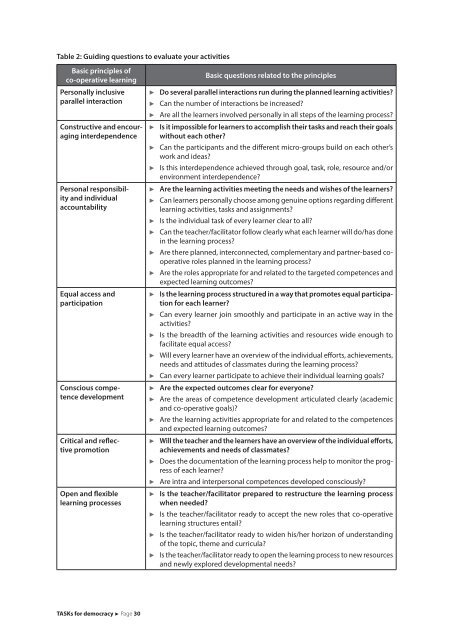TASKs for democracy
4NYw4W
4NYw4W
Create successful ePaper yourself
Turn your PDF publications into a flip-book with our unique Google optimized e-Paper software.
Table 2: Guiding questions to evaluate your activities<br />
Basic principles of<br />
co-operative learning<br />
Personally inclusive<br />
parallel interaction<br />
Constructive and encouraging<br />
interdependence<br />
Personal responsibility<br />
and individual<br />
accountability<br />
Equal access and<br />
participation<br />
Conscious competence<br />
development<br />
Critical and reflective<br />
promotion<br />
Open and flexible<br />
learning processes<br />
<br />
<br />
<br />
<br />
<br />
<br />
<br />
<br />
<br />
<br />
<br />
<br />
<br />
<br />
<br />
<br />
<br />
<br />
<br />
<br />
<br />
<br />
<br />
<br />
<br />
<br />
<br />
Basic questions related to the principles<br />
Do several parallel interactions run during the planned learning activities?<br />
Can the number of interactions be increased?<br />
Are all the learners involved personally in all steps of the learning process?<br />
Is it impossible <strong>for</strong> learners to accomplish their tasks and reach their goals<br />
without each other?<br />
Can the participants and the different micro-groups build on each other’s<br />
work and ideas?<br />
Is this interdependence achieved through goal, task, role, resource and/or<br />
environment interdependence?<br />
Are the learning activities meeting the needs and wishes of the learners?<br />
Can learners personally choose among genuine options regarding different<br />
learning activities, tasks and assignments?<br />
Is the individual task of every learner clear to all?<br />
Can the teacher/facilitator follow clearly what each learner will do/has done<br />
in the learning process?<br />
Are there planned, interconnected, complementary and partner-based cooperative<br />
roles planned in the learning process?<br />
Are the roles appropriate <strong>for</strong> and related to the targeted competences and<br />
expected learning outcomes?<br />
Is the learning process structured in a way that promotes equal participation<br />
<strong>for</strong> each learner?<br />
Can every learner join smoothly and participate in an active way in the<br />
activities?<br />
Is the breadth of the learning activities and resources wide enough to<br />
facilitate equal access?<br />
Will every learner have an overview of the individual ef<strong>for</strong>ts, achievements,<br />
needs and attitudes of classmates during the learning process?<br />
Can every learner participate to achieve their individual learning goals?<br />
Are the expected outcomes clear <strong>for</strong> everyone?<br />
Are the areas of competence development articulated clearly (academic<br />
and co-operative goals)?<br />
Are the learning activities appropriate <strong>for</strong> and related to the competences<br />
and expected learning outcomes?<br />
Will the teacher and the learners have an overview of the individual ef<strong>for</strong>ts,<br />
achievements and needs of classmates?<br />
Does the documentation of the learning process help to monitor the progress<br />
of each learner?<br />
Are intra and interpersonal competences developed consciously?<br />
Is the teacher/facilitator prepared to restructure the learning process<br />
when needed?<br />
Is the teacher/facilitator ready to accept the new roles that co-operative<br />
learning structures entail?<br />
Is the teacher/facilitator ready to widen his/her horizon of understanding<br />
of the topic, theme and curricula?<br />
Is the teacher/facilitator ready to open the learning process to new resources<br />
and newly explored developmental needs?<br />
<strong>TASKs</strong> <strong>for</strong> <strong>democracy</strong> Page 30


